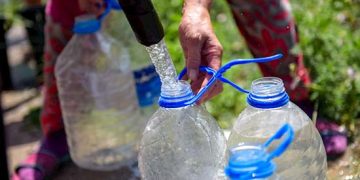The World Bank’s Board of Executive Directors on June 23 approved a US$45 million International Development Association (IDA)’s grant for the Tajikistan Water Supply and Sanitation Investment Project, ASIA-Plus reported. According to the World Bank Country Office for Tajikistan, the overall goal is to support Tajikistan in improving access of rural populations to safe water supply services, and investing in the capacity of institutions to deliver better quality water supply and sanitation services.
“Access to safe drinking water has always been a priority for the World Bank in Tajikistan, because it is a critical element for building healthy and productive human capital,” said Ozan Sevimli, World Bank Country Manager for Tajikistan. “Poor access to water and sanitation disproportionally impacts poor households living in rural areas, especially women and children. Without proper investments in rural water supply and sanitation, achieving our common goals of poverty reduction and economic growth is impossible.”
Although access of the population to improved water sources in Tajikistan has increased from over 75% in 2012 to over 84% in 2020, Tajikistan still has the lowest share of population in Central Asia, around 55%, with access to safely managed water supply services.
Over the past decade, Tajikistan has embarked on a process of important water sector transformation, which is yet to be completed. The country adopted a new Law on Drinking Water Supply and Wastewater, introduced revisions to the National Water Code and revised the legislative and regulatory framework documents for the sector.
Given the lack of reliable data on coverage and quality of water supply services, Tajikistan initiated in 2021 the development of a National Water Supply and Sanitation Program until 2030, which sets a baseline and strategic vision for ensuring universal coverage of the population with safely managed and affordable water supply services. – Kabar
- Latest
- Trending





